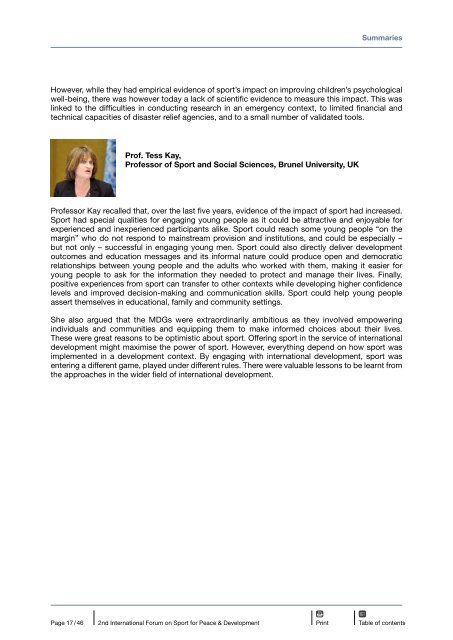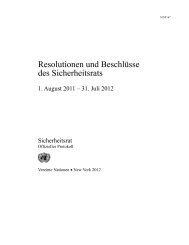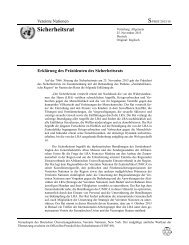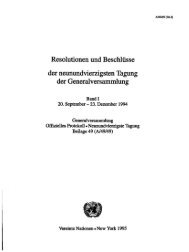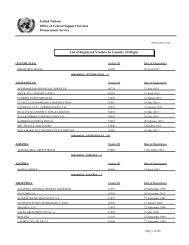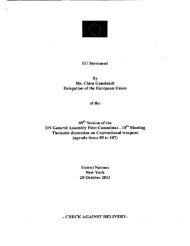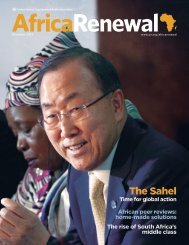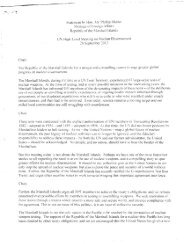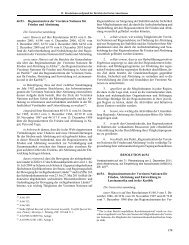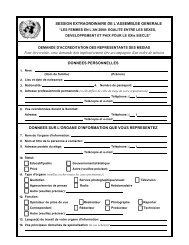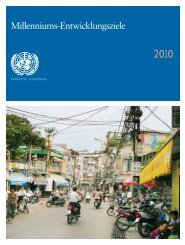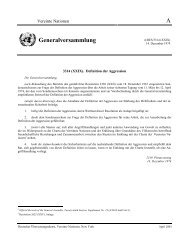2nd International Forum on Sport for Peace - Naciones Unidas
2nd International Forum on Sport for Peace - Naciones Unidas
2nd International Forum on Sport for Peace - Naciones Unidas
Create successful ePaper yourself
Turn your PDF publications into a flip-book with our unique Google optimized e-Paper software.
Page 17 / 46<br />
summaries<br />
However, while they had empirical evidence of sport’s impact <strong>on</strong> improving children’s psychological<br />
well-being, there was however today a lack of scientific evidence to measure this impact. This was<br />
linked to the difficulties in c<strong>on</strong>ducting research in an emergency c<strong>on</strong>text, to limited financial and<br />
technical capacities of disaster relief agencies, and to a small number of validated tools.<br />
Prof. Tess Kay,<br />
Professor of sport and social sciences, Brunel university, uK<br />
Professor Kay recalled that, over the last five years, evidence of the impact of sport had increased.<br />
<strong>Sport</strong> had special qualities <strong>for</strong> engaging young people as it could be attractive and enjoyable <strong>for</strong><br />
experienced and inexperienced participants alike. <strong>Sport</strong> could reach some young people “<strong>on</strong> the<br />
margin” who do not resp<strong>on</strong>d to mainstream provisi<strong>on</strong> and instituti<strong>on</strong>s, and could be especially –<br />
but not <strong>on</strong>ly – successful in engaging young men. <strong>Sport</strong> could also directly deliver development<br />
outcomes and educati<strong>on</strong> messages and its in<strong>for</strong>mal nature could produce open and democratic<br />
relati<strong>on</strong>ships between young people and the adults who worked with them, making it easier <strong>for</strong><br />
young people to ask <strong>for</strong> the in<strong>for</strong>mati<strong>on</strong> they needed to protect and manage their lives. Finally,<br />
positive experiences from sport can transfer to other c<strong>on</strong>texts while developing higher c<strong>on</strong>fidence<br />
levels and improved decisi<strong>on</strong>-making and communicati<strong>on</strong> skills. <strong>Sport</strong> could help young people<br />
assert themselves in educati<strong>on</strong>al, family and community settings.<br />
She also argued that the MDGs were extraordinarily ambitious as they involved empowering<br />
individuals and communities and equipping them to make in<strong>for</strong>med choices about their lives.<br />
These were great reas<strong>on</strong>s to be optimistic about sport. Offering sport in the service of internati<strong>on</strong>al<br />
development might maximise the power of sport. However, everything depend <strong>on</strong> how sport was<br />
implemented in a development c<strong>on</strong>text. By engaging with internati<strong>on</strong>al development, sport was<br />
entering a different game, played under different rules. There were valuable less<strong>on</strong>s to be learnt from<br />
the approaches in the wider field of internati<strong>on</strong>al development.<br />
<str<strong>on</strong>g>2nd</str<strong>on</strong>g> <str<strong>on</strong>g>Internati<strong>on</strong>al</str<strong>on</strong>g> <str<strong>on</strong>g>Forum</str<strong>on</strong>g> <strong>on</strong> <strong>Sport</strong> <strong>for</strong> <strong>Peace</strong> & Development<br />
Print Table of c<strong>on</strong>tents


